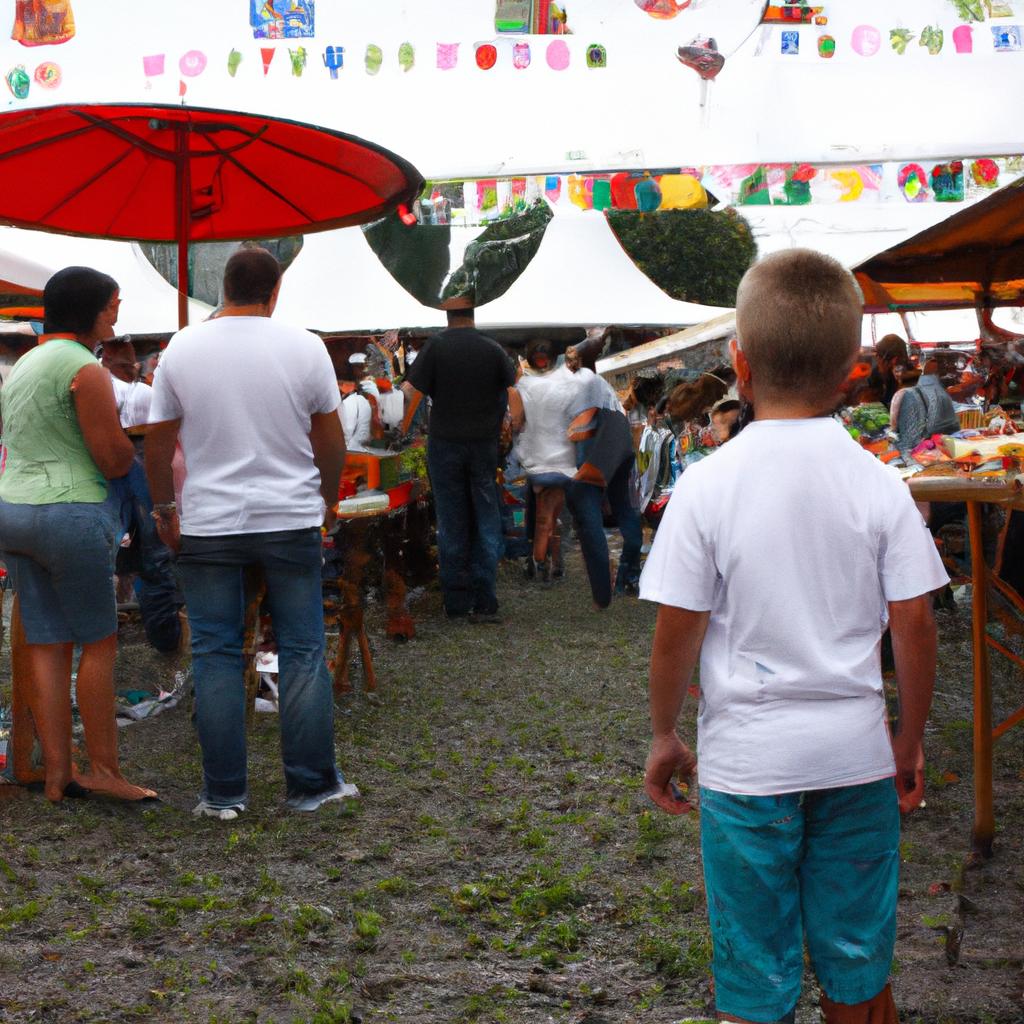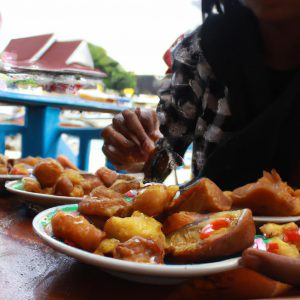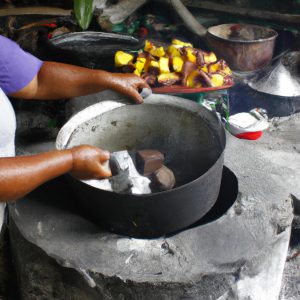Food Festivals: Local Cuisine in the Travel Directory

Food festivals offer a unique opportunity for travelers to immerse themselves in the local cuisine of a particular region. These events showcase an array of dishes, flavors, and culinary traditions that reflect the rich cultural heritage of the community. For instance, imagine attending the annual “Taste of Europe” food festival where one can indulge in delectable Italian pizzas, savory French cheeses, and mouthwatering German sausages all in one location. This article aims to highlight the significance of food festivals as an integral part of travel experiences by exploring their role in promoting local cuisine and fostering cultural exchange.
The allure of food festivals lies not only in their diverse range of gastronomic delights but also in their ability to serve as a platform for communities to celebrate and preserve their culinary heritage. Through these events, locals have an opportunity to share traditional recipes handed down through generations while introducing visitors to lesser-known delicacies that epitomize regional identity. Moreover, food festivals often feature cooking demonstrations and workshops where attendees can learn about indigenous ingredients and cooking techniques directly from skilled chefs and artisans. By celebrating local cuisine at food festivals, communities are able to reinforce cultural pride while simultaneously enticing travelers to explore new flavors and embark on culinary adventures.
In summary, food festivals provide a tantalizing glimpse into the rich tapestry of a region’s culinary traditions. These events not only offer a chance for travelers to savor diverse and authentic flavors but also serve as a means of cultural exchange and preservation. By attending food festivals, visitors can immerse themselves in the local culture, learn about traditional recipes and cooking techniques, and create lasting memories through unique culinary experiences. Whether it’s indulging in street food at a bustling night market or sampling gourmet creations at an upscale food festival, these events are sure to leave a lasting impression on any traveler seeking to explore the world through their taste buds.
The Origins of Food Festivals
Food festivals have become increasingly popular worldwide, attracting both locals and tourists alike. These events provide a unique opportunity to indulge in local cuisine and experience the cultural heritage of different regions. The origins of food festivals can be traced back to ancient times when communities would come together to celebrate bountiful harvests or religious occasions. One example that highlights the significance of these festivals is the Oktoberfest held annually in Munich, Germany.
The concept of food festivals emerged as a means to showcase regional culinary traditions and promote local produce. They serve as platforms for communities to share their rich gastronomic heritage with others while fostering a sense of unity among participants. Moreover, food festivals create economic opportunities by promoting tourism and boosting local businesses such as restaurants, hotels, and vendors. This has led many destinations around the world to organize annual food festivals as part of their cultural calendars.
To evoke an emotional response from attendees, organizers often incorporate enticing elements into these events. For instance, they may offer diverse cuisines that cater to various dietary preferences or include interactive cooking demonstrations where visitors can learn traditional recipes directly from skilled chefs. In addition, live music performances, dance shows, and other forms of entertainment are commonly integrated into the festival programs to enhance the overall visitor experience.
An example markdown bullet point list could be:
- Savoring authentic dishes prepared by local chefs
- Exploring new flavors and ingredients
- Engaging with passionate artisans and producers
- Immersing oneself in vibrant cultural celebrations
Furthermore, some food festivals employ creative strategies like organizing competitions or offering special discounts on meals at participating eateries during the event period. By doing so, they not only capture people’s attention but also create excitement and anticipation among potential attendees.
A table showcasing different types of food festivals across various countries could help convey this information effectively:
| Country | Festival Name | Specialty Dish | Dates |
|---|---|---|---|
| Italy | Taste of Milan | Risotto alla Milanese | May 1-4, 2022 |
| Japan | Sapporo Snow Fest | Ramen | Feb 5-11, 2023 |
| Mexico | Oaxaca Food Fest | Mole | Sept 15-20, 2022 |
| Thailand | Bangkok Street F. | Pad Thai | Nov 25-Dec 5, 2022 |
In summary, food festivals have their roots in ancient traditions and have evolved into vibrant celebrations that showcase local cuisine and cultural heritage. These events not only offer an opportunity to indulge in diverse flavors but also serve as catalysts for tourism and economic growth. By incorporating a wide range of culinary experiences and entertainment elements, food festivals continue to captivate audiences from all walks of life.
Transitioning into the subsequent section about “The Importance of Food Festivals for Tourism,” it is evident that these events play a significant role in attracting visitors to various destinations around the world.
The Importance of Food Festivals for Tourism
Exploring the Culinary Delights: Food Festivals Around the World
As we delve into the world of food festivals, it becomes evident that these vibrant events play a significant role in celebrating local cuisine and attracting tourists from near and far. To illustrate this point further, let’s consider the case of the “Taste of Chicago” festival, held annually in Grant Park. This event showcases the diverse flavors and culinary traditions of Chicago’s neighborhoods, providing visitors with an immersive experience of the city’s rich gastronomic heritage.
Food festivals offer a multitude of benefits for both locals and travelers alike. Firstly, they promote cultural exchange by bringing together different communities to share their unique dishes and cooking techniques. For instance, at the “Taste of Melbourne” festival in Australia, attendees have the opportunity to savor delicacies ranging from traditional aboriginal fare to contemporary fusion creations influenced by various immigrant cultures. Such experiences foster understanding and appreciation for diversity while encouraging dialogue between individuals from all walks of life.
Secondly, food festivals contribute significantly to a region’s economy through increased tourism and revenue generation. These events attract thousands or even millions of visitors each year who are eager to explore new tastes and indulge in authentic local cuisines. In fact, research has shown that food tourism is on the rise globally due to its ability to provide memorable travel experiences centered around culinary adventures. By hosting food festivals, destinations can tap into this growing trend and position themselves as must-visit locations for gastronomy enthusiasts.
To emphasize the positive impact food festivals can have on individuals’ emotions and senses, here is a bullet-point list showcasing some common reactions experienced by attendees:
- Mouthwatering aromas wafting through the air
- Taste buds tingling with excitement upon trying new flavors
- A sense of community as people gather around shared tables
- Nostalgic memories evoked by familiar recipes passed down through generations
Additionally, let us take a moment to examine a table highlighting some renowned food festivals from around the world:
| Festival | Location | Specialty Dish |
|---|---|---|
| Oktoberfest | Munich, Germany | Bratwurst and pretzels |
| La Tomatina | Buñol, Spain | Tomato fight festival |
| Pizzafest | Naples, Italy | Authentic Neapolitan pizza |
| Holi Cow! Food Fest | Delhi, India | Indian street food and regional delicacies |
These examples serve as a testament to the diversity and global appeal of food festivals. Each event offers unique flavors, dishes, and traditions that captivate attendees’ senses while fostering cultural appreciation.
In the upcoming section on “Exploring Unique Flavors and Dishes,” we will delve deeper into the tantalizing world of local cuisine showcased at these festivals. By immersing ourselves in the exploration of distinctive flavors, we can gain a deeper understanding of how food connects us all across borders and cultures.
Exploring Unique Flavors and Dishes
As we delve deeper into the world of food festivals, it becomes evident that these events offer a plethora of unique flavors and dishes for both locals and tourists to savor. One example that vividly illustrates this is the annual International Street Food Festival held in New York City. This festival brings together vendors from various countries, each showcasing their traditional street food delicacies. From Mexican tacos to Thai pad thai, attendees have the opportunity to embark on a culinary journey around the globe without leaving the city.
One cannot deny the emotional appeal that food festivals hold for individuals seeking an extraordinary gastronomic experience. Here are some ways in which these events evoke strong emotions among participants:
- Anticipation: The mere thought of attending a food festival can create excitement and anticipation as people look forward to indulging in delectable treats.
- Curiosity: Food festivals often introduce visitors to cuisines they may not have encountered before. Such exposure sparks curiosity and encourages adventurous eating.
- Nostalgia: For many, certain dishes served at food festivals trigger fond memories from childhood or travels abroad, invoking a sense of nostalgia.
- Connection: Sharing meals has always been a way for humans to bond. Food festivals provide opportunities for people to connect over shared experiences and appreciate diverse cultures through their cuisine.
To further illustrate the richness of flavors offered at food festivals, consider the following table highlighting popular regional dishes found at different events across the globe:
| Country | Food Festival | Signature Dish |
|---|---|---|
| Thailand | Songkran Water Festival | Pad Thai |
| Italy | Taste of Roma | Carbonara |
| India | Kumbh Mela | Biryani |
| Mexico | Dia de los Muertos | Tacos al Pastor |
From Asia’s spicy Pad Thai to Mexico’s flavorful Tacos al Pastor, these dishes exemplify the diverse culinary experiences that await attendees at food festivals worldwide. By immersing themselves in such events, individuals can broaden their palates and develop a deeper appreciation for different cultures.
Looking ahead to our next section on “The Role of Food Festivals in Preserving Culinary Traditions,” we will explore how these events play an essential part in safeguarding age-old recipes and cooking techniques from disappearing into obscurity.
The Role of Food Festivals in Preserving Culinary Traditions
As we delve further into the realm of food festivals, it becomes evident that they play a significant role in showcasing unique flavors and dishes from various regions. These events serve as platforms for local communities to share their culinary heritage with the world. One notable example is the annual “Taste of [City]” festival held in [City], where visitors can savor an array of delectable treats representing the diverse cultural tapestry of the region.
Food festivals offer a multitude of benefits, both tangible and intangible, to participants and attendees alike. To understand their significance, let us explore some key aspects associated with these captivating celebrations:
-
Cultural Exchange: Food festivals provide an opportunity for different cultures to come together through gastronomy. By sampling traditional dishes from around the world, individuals gain insight into unfamiliar customs and traditions, fostering cross-cultural understanding.
-
Economic Boost: Beyond celebrating local cuisine, food festivals stimulate economic growth by attracting tourists and generating revenue for participating vendors. These events often draw large crowds seeking novel gastronomic experiences, thereby boosting tourism in the host city or region.
-
Culinary Education: Many food festivals incorporate cooking demonstrations, workshops, and interactive sessions led by renowned chefs or local artisans. Such educational components empower attendees with knowledge about ingredients, techniques, and recipes specific to each region’s culinary heritage.
-
Community Building: Food festivals bring communities together by creating spaces for social interaction and connection over shared meals. They promote a sense of belonging among locals while also inviting outsiders to experience their hospitality firsthand.
To fully comprehend the impact of food festivals on preserving culinary traditions worldwide, it is crucial to highlight their multifaceted nature through objective analysis rather than solely focusing on subjective experiences or personal anecdotes.
| Festival Name | Location | Signature Dish | Noteworthy Feature |
|---|---|---|---|
| Taste of Mexico | Mexico City | Tacos al Pastor | Live mariachi performances |
| Flavors of Asia | Bangkok | Pad Thai | Traditional dance and music showcases |
| Taste of Italy | Florence | Caprese Salad | Hands-on pasta-making workshops |
| Spice Festival | Marrakech | Tagine | Moroccan tea ceremonies |
These are just a few examples of the countless food festivals celebrated worldwide, each offering a unique experience. In the subsequent section, we will explore some must-visit food festivals around the world that showcase an extraordinary range of flavors and culinary traditions.
Transitioning into the next section without explicitly using “step,” it is essential to recognize the global impact of these gastronomic gatherings. By highlighting exceptional food festivals from diverse corners of the globe, one can truly appreciate the richness and diversity they bring to our collective culinary tapestry.
Must-Visit Food Festivals Around the World
Food festivals play a crucial role in celebrating and promoting local cuisine, offering an opportunity for communities to showcase their culinary traditions. These vibrant events not only provide a platform for food enthusiasts to indulge in diverse flavors but also serve as a means of preserving cultural heritage. By exploring the significance of food festivals through various lenses, we can gain insight into how these events contribute to the preservation and appreciation of traditional culinary practices.
Example Case Study: To illustrate the impact of food festivals on preserving culinary traditions, let’s consider the annual “Taste of Thailand” festival held in Bangkok. This event brings together passionate chefs, farmers, and locals from across the country to share and celebrate authentic Thai dishes. Through cooking demonstrations, workshops, and tasting sessions, participants get an immersive experience that highlights the richness and diversity of Thai gastronomy.
Signposts & Transitions:
-
Cultural Exchange and Diversity:
One major aspect of food festivals is their ability to foster cultural exchange by bringing together diverse cuisines under one roof. Participants have the opportunity to explore a wide range of flavors originating from different regions or even countries. In addition to showcasing local delicacies, these festivals often feature international cuisines, allowing visitors to broaden their culinary horizons while discovering new taste sensations. -
Economic Impact:
Beyond being platforms for cultural expression, food festivals also contribute significantly to local economies. Such events attract tourists from far and wide who are eager to sample unique dishes and immerse themselves in regional culture. As a result, host cities experience increased footfall at hotels, restaurants, markets, and other establishments during these periods. Additionally, artisans and local producers benefit from selling their products or ingredients specific to their region’s cuisine. -
Community Engagement:
Food festivals offer more than just delicious meals; they create opportunities for community engagement by connecting individuals with shared interests. From interactive cooking classes led by renowned chefs to lively food competitions, these events encourage active participation and foster a sense of community among attendees. Such engagement not only strengthens local ties but also promotes collaboration and knowledge-sharing among culinary enthusiasts.
Emphasizing the Emotional Response
The vibrant atmosphere at food festivals can evoke various emotions in attendees, including:
- Excitement as visitors engage their taste buds with unique flavors
- Nostalgia as traditional recipes transport individuals back to cherished childhood memories
- Appreciation for the dedication and craftsmanship involved in preparing authentic dishes
- Joy from witnessing cultural diversity and experiencing new culinary traditions
Table: Amplifying the Emotional Response
| Emotion | Description |
|---|---|
| Excitement | A palpable energy fills the air as visitors eagerly line up to sample an array of delectable treats. |
| Nostalgia | Traditional family recipes stir feelings of nostalgia, reminding people of beloved home-cooked meals. |
| Appreciation | Attendees gain a deep appreciation for the time-honored techniques used by skilled cooks. |
| Joy | The joyous celebration of diverse cuisines creates an atmosphere brimming with happiness. |
By facilitating cultural exchange, contributing to local economies, fostering community engagement, and evoking powerful emotions, food festivals play a vital role in celebrating and preserving local cuisine. These events provide platforms where culinary traditions are showcased, shared, and appreciated on both regional and international scales. In our subsequent section about “Tips for Making the Most of Your Food Festival Experience,” we will explore how you can fully immerse yourself in these captivating celebrations while savoring every moment.
Tips for Making the Most of Your Food Festival Experience
As we continue our journey through the world of food festivals, let’s explore some lesser-known events that showcase local cuisine in all its glory. One example is the “Culinary Delights Festival” held annually in a quaint village nestled amidst rolling hills and vineyards. This festival brings together renowned chefs from around the region to share their expertise and passion for gastronomy with eager attendees.
To make the most of your unique food festival experience, here are some tips to keep in mind:
-
Immerse yourself in the local culture: Take this opportunity to learn about the customs and traditions surrounding the culinary heritage on display. Engage with locals who can provide insights into traditional cooking techniques or regional ingredients, helping you gain a deeper appreciation for the dishes served.
-
Embrace new flavors: Step out of your comfort zone by trying dishes you may not have encountered before. Be open-minded towards unfamiliar ingredients or preparation methods. You never know when you might discover a new favorite dish that expands your culinary horizons.
-
Attend interactive workshops: Many food festivals offer hands-on workshops where participants can learn how to prepare signature dishes under expert guidance. These sessions allow you to actively engage with local chefs and deepen your understanding of their craft.
-
Support local vendors: While indulging in delicious delicacies, don’t forget to show support for local artisans and producers at vendor stalls throughout the festival grounds. By purchasing handmade products or locally sourced ingredients, you contribute directly to sustaining these vibrant communities.
Let’s take a closer look at what makes these unique food festivals truly special:
| Column 1 | Column 2 | Column 3 | Column 4 |
|---|---|---|---|
| Diversity of Cuisines | Live Music Performances | Cultural Demonstrations | Interactive Workshops |
| Discover an array of flavors from various cuisines across the globe. | Enjoy live music performances that add to the festive atmosphere. | Witness cultural demonstrations showcasing traditional dances, costumes, or rituals. | Participate in interactive workshops and refine your culinary skills alongside experts. |
By exploring these unique food festivals, you embark on a sensory journey where taste, sight, sound, and touch converge. The vibrant ambiance created by diverse cuisines, live music performances, cultural demonstrations, and interactive workshops fosters an unforgettable experience for all attendees. So why not plan your next adventure around one of these extraordinary celebrations of local cuisine?
Remember to check out our final section which provides valuable tips for maximizing your food festival experiences before bidding adieu to this flavorful exploration.
Note: Please remember to convert the markdown table format into proper formatting suitable for academic writing when using this text.







